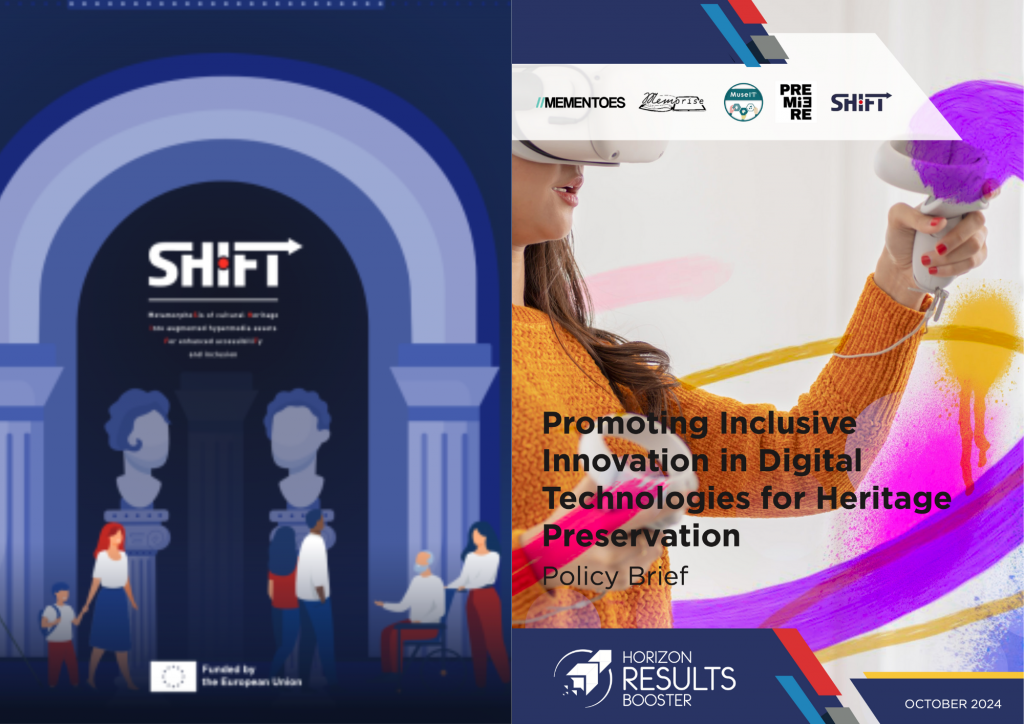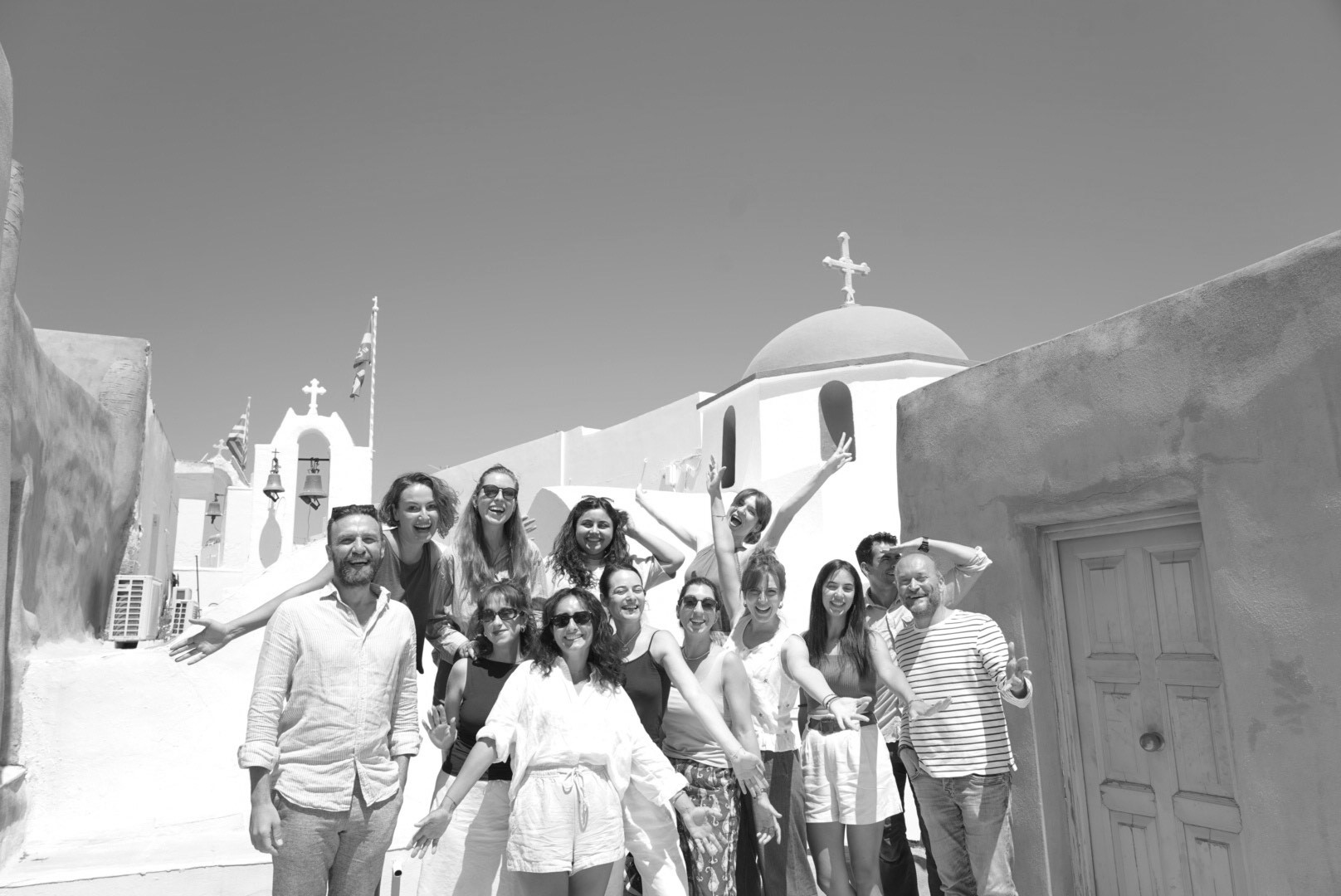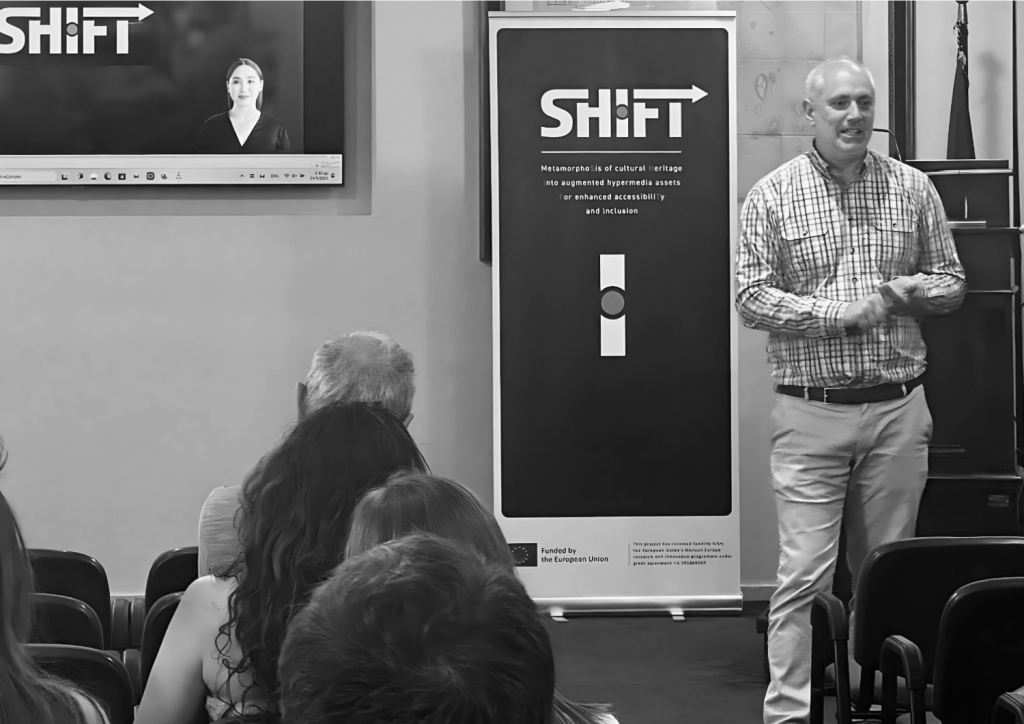Tag Archives: shiftprojeceu
New SHIFT publications
HERITΛGE is proud to be part of the SHIFT project, collaborating with 12 partners, including heritage organizations, universities, research centers, and private businesses. Together, we aim to make cultural heritage more accessible, inclusive, and engaging by leveraging cutting-edge technologies such as artificial intelligence, machine learning, and haptics.
This year, the project has delivered two important publications, both available for free download:
Inclusion in Museums: A Collection of Best Practices
Produced by the Balkan Museum Network (BMN), this e-book showcases best practices for fostering inclusion in museums across the Balkans. The publication features insights from heritage experts on implementing inclusive strategies, highlighting successes, identifying challenges, and outlining steps for future progress. An audiobook version will be available soon.
Promoting Inclusive Innovation in Digital Technologies for Heritage Preservation
SHIFT, along with four sister projects funded under Horizon Europe’s 2021 call for proposals (Cluster 2: Culture, Creativity & Inclusive Society), has released a collaborative policy brief. This document provides actionable recommendations for policymakers to address expertise gaps, enhance digital education, and promote inclusion within the cultural heritage sector. Download the policy brief to learn more.
SHIFT is funded under the European Union’s Horizon Europe program, Cluster 2: “Culture, Creativity & Inclusive Society,” which focuses on innovative research in European cultural heritage and the cultural and creative industries.
Stay tuned for more SHIFT updates and developments in 2025!
Community Engagement Encounters in Paros
Twenty two cultural heritage managers were able to explore the Greek island of Paros and dive deep into its communities during this years’ Engaging Communities in Cultural Heritage Summer Field School that ran from June 17 to June 30. Eleven of our trainees attended online and another eleven in person.
“The Summer School was amazing, very intense, both in terms of our schedule but also in terms of the relationships that we were building and the activities we undertook outside the classroom, from participant observation to to a very casual outing or an invitation to a local event,” said Dr. Lena Stefanou.
This summer’s trainees came from Africa, Asia, Europe and North America – Azerbaidjan, Bangladesh, France, Greece, Kenya, Lithuania, Malawi, Nigeria, Romania, South Africa, Sudan, Switzerland, Tanzania Turkey, Uganda, the United Kingdom, USA, and Zimbabwe.
The training sessions as well as the final event, during which the participants presented their work to the wider community in Paros, all took place in the Dimitrakopoulos Building in the town of Paroikia that was generously made available by the Municipality of Paros.
During this intensive 2-week field school, participants were introduced to the principles of community engagement and heritage values and presented with a dynamic mode of interdisciplinary research tailored to community needs.
“Community engagement is often messy and unpredictable work. Participants in our Community Engagement Summer school gain the skills and techniques to conduct their own research, to plan effective community engagement projects that are tailor-made for the communities they are working with” said Dr. Aris Anagnostopoulos, HERITΛGE Community Engagement Manager.
Trainees had the opportunity to do collaborative research and get involved in community engagement initiatives. They also received training in applied ethnography, conducted oral history interviews, learned to document personal narratives, and file and catalogue oral history archives. They also practiced curating multimedia content and creating narratives for online presentations and/or podcasts and explored the possibilities of cultural heritage becoming part of online repositories and temporary exhibitions.
Participants also attended lectures by invited speakers who specialize on diverse heritage fields and had the opportunity to hear from representatives of HERITΛGE partners Paros Festival and Ai Mnimai who presented real-life, local case studies on community engagement and cultural heritage.
“I applied to this workshop to improve my fieldwork methodology, and I found it greatly helped me develop because I was able to learn about those details that we cannot learn without going into the field and starting to work. It has really helpful for me on how to conduct my research questions and how to engage with the people I am interviewing,” said Elif Aydin, a PhD Candidate at Istanbul Technical University.
Summer school participants also had the opportunity to attend a presentation of SHIFT, a project funded by Horizon Europe to help make cultural heritage more accessible, inclusive and appealing using techological advances in artificial intelligence, machine learning, haptics, and other sectors.
SHIFT Consortium Advances Cultural Heritage Accessibility: Highlights from Athens Event
The HERITΛGE team was very happy to host our colleagues from the SHIFT project Consortium in Athens last week to discuss progress made and the next steps the consortium will take in its work to make cultural heritage more accessible, inclusive and appealing for all. The consortiun also presented the project which is funded by the European Union’s Horizon Europe program, to a select group of heritage professionals, policy makers, and stakeholders on Friday May 24th, during an event at the Athenian Museum.
HERITΛGE’s director, Dr. Evangelos Kyriakidis, opened the event, underlining the significance of the project: “We are very proud of the Organization’s participation in the SHIFT program and happy to be able to present here in Athens the first samples of the partner’s work with the aim of making cultural heritage more accessible, inclusive and attractive,” Kyriakidis said.
Razvan Purcarea from project coordinator SIMAVI briefly presented the project with help from representatives from Queen Mary University of London, the Technical University of Munich, the Foundation for Research and Technology (FORTH), and the technology company audEERING, all members of the SHIFT consortium. During the event, Dr. Angelos Giokas from the Athena Research Center gave a brief presentation of PREMIERE, a project for accessibility and inclusion in the performing arts, which is also funded by the European Union’s Horizon Europe program.
Learn more about SHIFT: https://shift-europe.eu/




